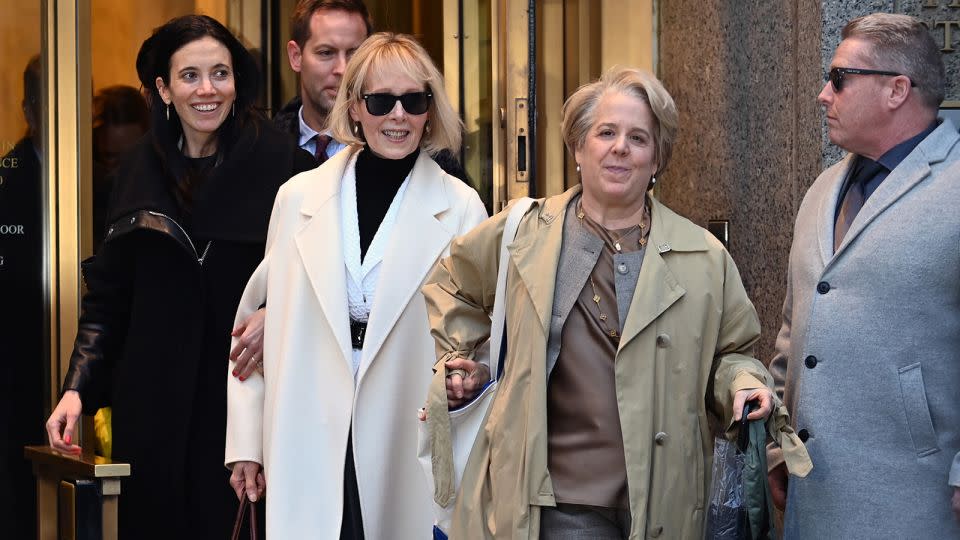Attorney Roberta Kaplan said former President Donald Trump threw papers on a table and stormed out during a deposition at Mar-a-Lago after learning his legal team had agreed to provide him with lunch.
Kaplan, who has represented clients in high-profile cases against Trump including E. Jean Carroll, said in an episode of the podcast “George Conway Explains It All (to Sarah Longwell)” recorded Thursday that he rejected the former president’s request that he work during the lunch break because he believed the statement was “a waste of time.”
“And then you could see the wheels turning in his brain. You could really almost see it,” Kaplan told Republican strategist Sarah Longwell and conservative lawyer George Conway, a longtime Trump critic. “And he said, ‘Well, you’re here at Mar-a-Lago. What do you think you’re going to do for lunch? Where are you going to lunch?'”.
Kaplan said he told her that his attorneys had “graciously offered to provide” lunch for his team, a common civil practice between opposing legal teams.
“At that moment there was a huge pile of documents, evidence, in front of him, and he took the pile and threw it on the table. And he stormed out of the room,” Kaplan shared, adding that Trump specifically yelled at his attorney Alina Habba for giving them lunch.
“He really yelled at Alina for that. He was very angry with Alina,” he said.
Kaplan continued, “He came back in and said, ‘Well, did you like lunch?’ And I said, ‘Well, sir, I ate a banana.’ You know, I can never eat when I’m taking testimonies. And he said, ‘Well, I told you so’; It was something lovely. He said, ‘I told you, I told them to make you really bad sandwiches, but they can’t help it here.’ We have the best sandwiches.’”
Kaplan was deposing Trump in Mar-Lago in a lawsuit that alleged the former president was involved with a fraudulent marketing company. A federal judge dismissed the lawsuit last month.
In a separate anecdote, Kaplan detailed the end of the statement as she was ready to leave, saying Trump told her, “See you next Tuesday,” a phrase often used as a derogatory euphemism directed at women.
“We walk into the room and I say, ‘I’m done asking questions,’ and I immediately hear from the other side, ‘Off the record.’ Off the record. Off the record.’ So they must have planned it. And he looks at me from across the table and says, ‘See you next Tuesday,’” she said.
Kaplan said she was confused at first, since her next meeting was set for Wednesday. “You could tell it was like a kind of joke again, like teenagers used to think of. But again, I wasn’t in on the joke,” she said.
“I wasn’t in on the prank, so I had no idea. Then we get in the car and my colleagues say, ‘Robbie, do you know what that means?’ And I said, ‘No, what are you talking about?’ They tell me and I say, my God, thank God I didn’t know because if I had known, I sure would have been angry. There’s no doubt he would have pissed me off,” Kaplan said.
CNN has contacted representatives for Trump and Habba.
Kaplan’s comments come a week after his victory in Carroll’s defamation suit against Trump. A jury awarded Carroll, a former magazine columnist who alleged that Trump raped her in a department store in the mid-1990s and then defamed her when he denied her claim, $83.3 million. Trump is expected to appeal the verdict.

Kaplan also described last week’s verdict as a career-defining moment. When asked which felt better: winning the defamation case against Trump or his successful challenge of the Defense of Marriage Act in 2013 that led to the eventual Supreme Court ruling that cleared the way for same-sex marriage , Kaplan noted his recent victory.
“I have spent my entire life dedicated to the principle that we have the rule of law and a functioning judicial system,” Kaplan said. “And that is what makes us a constitutional democracy that, at least until recently, was admirable around the world. And it was starting, I mean, at times when it seems like that may not be true.”
But he added: “This case validated that, at least so far, we still have all of that.”
For more CNN news and newsletters, create an account at CNN.com
